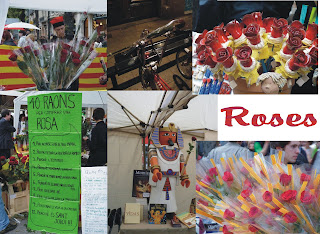In linguistics, code switching means changing the language (or code) in the same discourse. That is, when a bilingual o multilingual person is speaking they may switch the language in which they are talking. Everyone who knows more than one language can do that, but it may not be a usual thing for them. But what happens in a society, like Catalan society, who is bilingual by default and two languages are part of common life? What happens is that code switching is the meal of every day, a daily constant, and most people living in Catalonia do it all the time without even noticing or caring.
And what is more interesting, we can have a conversation when people speak in Catalan and other people speak in Spanish all the time and no one is amazed. It was not until an English asked me how we could do that and not finding it strange, that I did not realise how shocking this could be for a foreigner.
We are switching the code all the time! If I had to think how many times I changed from Catalan to Spanish and back to Catalan today, I could not be able to tell. I don't know...maybe like five times an hour depending to whom I spoke. Or even more. Haven't got a clue. However, if I have to say which is the language I speak most, I would say Catalan. A few years ago it was the only language I used, but since I came to live in Barcelona, I began to use Spanish and now I use about Spanish about 20% of the time.
But how code switching works? I have tried to think why do I switch code and about the different scenarios. Basically, in my everyday life I find myself doing this:
1- My colleague Judit is Catalan and we always talk in Catalan to each other. So that is one situation in which there is no code switching.

2- My colleague Marta is from Bilbao and Spanish is her mother tongue. She's been living in Catalonia for a few years and she understands Catalan, but we spoke in Spanish since we met and we always speak in Spanish to each other now. In this situation, as a Catalan native, I switch the code to Spanish, but there is no code switching in the conversation.

3- My colleague José is from Galicia and he came to live in Barcelona last year. He speaks Spanish at home and Galician with some of his friends. He learnt Catalan at university, he understands it perfectly and asks me to talk in Catalan to him so he keeps on learning it, but he feels a bit insecure still and replies in Spanish. In this situation, there is no verbal code switching, but our brains are processing the messages in two languages at the same time!

4- My colleague José sometimes tries to talk in Catalan as he wants to gain confidence. On my side, I sometimes forget that he wants me to talk in Catalan to him and we are moving from Catalan to Spanish all the time. This means that we are switching the code all the time!

5- In a conversation possibilities multiply, but the most usual thing in my everyday life is that some people always talk in Catalan, some others always do so in Spanish and some other switch the code depending on the person they talk to, even in the same group conversation.

I usually do not mind to change the code and, as I pointed out I don't even realise I do so. On the other hand I also think that code switching can be a trap. Does it really means language command? What are the negative effects? It is always positive?
For me, code switching, its pros and cons. It is indeed enriching to have this phenomenon, but it can show lack of language command. Typical code switching means occasionally introducing words and syntactic structures from Catalan into Spanish and the other way round. If the speaker is aware that they may do so and is able to know what belongs to what language, then it is ok, nothing happens! It is very difficult to speak perfectly all the time, managing two language in the same casual conversation! On the other hand, it is indeed a problem if the person does not know it, because they will reproduce these errors in writing and in speaking all the time. And this can be very annoying, because it is no longer code switching but lack of linguistic competence and it can be very annoying both for native speakers of Catalan and of Spanish.
I am not really feeling to go deeper into this today as my aim waysjust explaining what happens with code switching in Catalonia and how I, as a Catalan, experience it as a real fact. Pondering about it will be a topic for another post.













